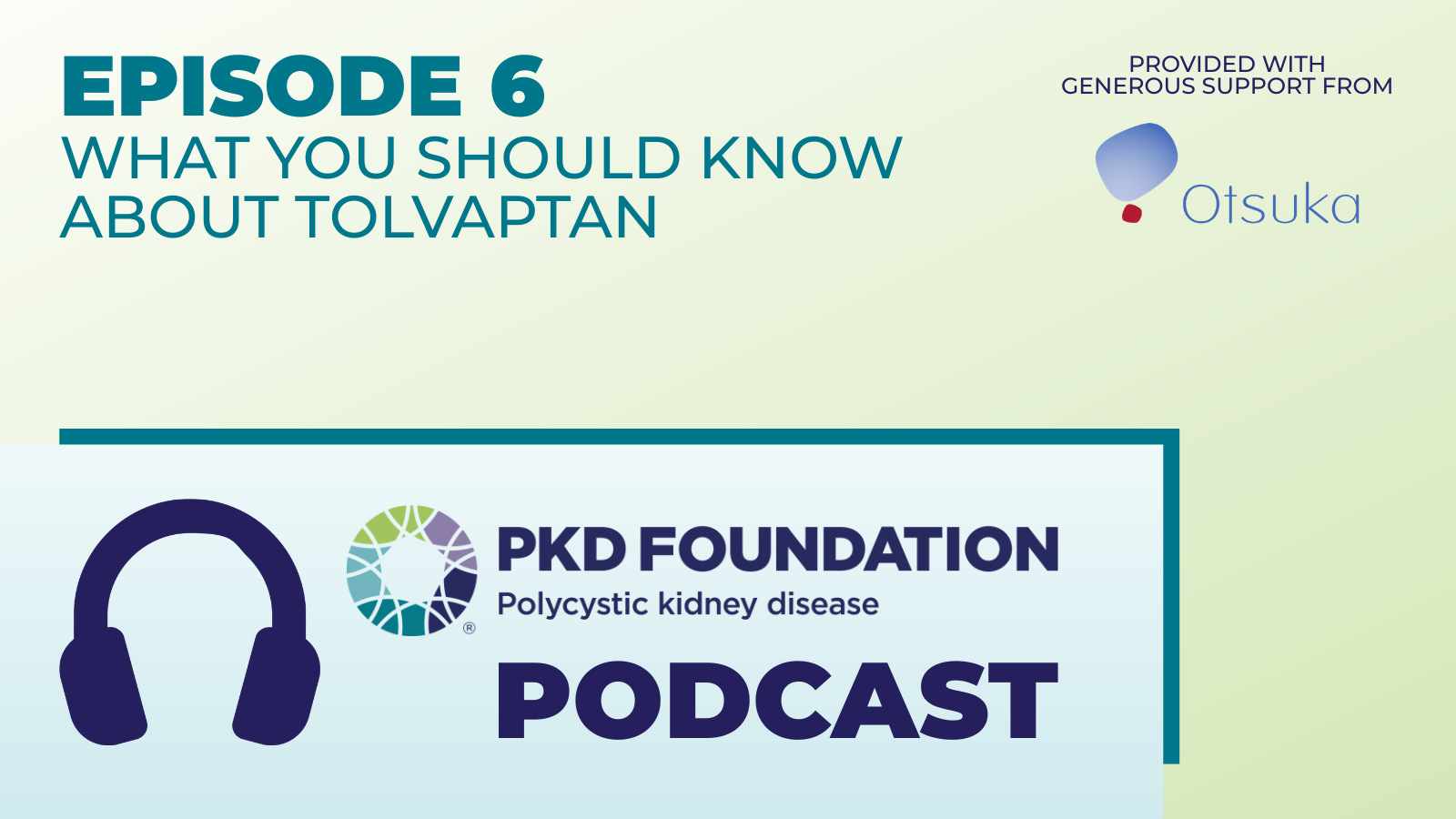Learn from the world’s leading medical experts about PKD and how to live a better life. Dive deeper into specific topics:

Explore our resource library for all the helpful content, stories, and research you need.

- ADPKD
- Drug Therapy and Treatments
- Management
- Podcast
- Tolvaptan
- Treatment

- 2025
- ADPKD
- Complications
- Living with PKD
- Polycystic Liver Disease
- Webinar

- 2025
- ADPKD
- Caregivers
- Complications
- Education
- Living with PKD
- Newly Diagnosed
- Polycystic Liver Disease
- Symptoms
- The Basics of PKD
- Webinar

- 2025
- ADPKD
- Caregivers
- Complications
- Diagnosis
- Education
- genetic testing
- genetics
- Living with PKD
- Newly Diagnosed
- The Basics of PKD
- Webinar

- 2023
- ADPKD
- PKD
- Progression
- Webinar

- 2023
- ADPKD
- ARPKD
- Children
- Healthcare
- Healthcare Team
- PKD Parents
- Teens and Young Adults (13-20)
- Webinar

- 2023
- ADPKD
- ARPKD
- living donation
- Living donor
- Transplantation
- Webinar

- 2023
- ADPKD
- ARPKD
- living donation
- Living donor
- PKD
- Transplantation
- Webinar
FAQs

Yes, there are multiple ways PKD patients and families can find support. Through our PKD Communities, people can find opportunities to learn, connect, act, and ensure no one faces PKD alone.
There are three types of communities:
- Local Communities: based on geographical location
- PKD Thrive: for young adults with PKD
- PKD Parents: for parents of children with ADPKD and ARPKD
You can also find support through our PKD Connect Peer Mentors program. PKD Connect Peer Mentors provide resources, guidance, motivation, share their own experiences with PKD, and emotional support to an individual impacted by PKD.
If you need immediate support, call our HOPE Line at (844) 753-4673. Our team is available Monday through Friday from 8 a.m. – 5 p.m. (CT) to answer your questions and direct you to resources.

Yes, there is ongoing research into polycystic kidney disease (PKD) focused on developing more effective therapies and treatments to slow disease progression, manage symptoms, and ultimately find a cure. Researchers are exploring various approaches, including targeted medications to inhibit cyst growth, gene therapy to correct genetic mutations, and innovative surgical techniques. Clinical trials are also underway to evaluate the safety and efficacy of potential treatments for PKD. These research efforts offer hope for improved outcomes and quality of life for individuals living with PKD in the future.

Several lifestyle changes can help manage PKD and promote overall health:
- Maintain a healthy diet: Consuming a balanced diet low in sodium, saturated fats, and cholesterol can help manage blood pressure and reduce the risk of complications such as cardiovascular disease. Focus on incorporating fruits, vegetables, whole grains, lean proteins, and healthy fats into your meals.
- Stay hydrated: Drinking an adequate amount of water can help flush toxins from your body and prevent kidney stones, a common complication of PKD. Aim to drink plenty of water throughout the day, and limit consumption of caffeinated and alcoholic beverages.
- Manage blood pressure: High blood pressure is a common complication of PKD and can accelerate kidney damage. Work with your healthcare provider to monitor and manage your blood pressure through medication, lifestyle modifications, and regular check-ups.
- Maintain a healthy weight: Excess weight can strain the kidneys and worsen PKD symptoms. Aim to achieve and maintain a healthy weight through a combination of regular physical activity and a nutritious diet.
- Exercise regularly: Engaging in regular physical activity can help improve cardiovascular health, manage weight, and reduce stress. Choose activities that you enjoy and aim for at least 30 minutes of moderate-intensity exercise most days of the week.
- Quit smoking: Smoking can worsen kidney function and increase the risk of complications associated with PKD. If you smoke, quitting can significantly improve your overall health and reduce the progression of kidney disease.
- Manage stress: Chronic stress can negatively impact overall health and exacerbate PKD symptoms. Incorporate stress-reducing activities such as meditation, yoga, deep breathing exercises, or hobbies that you enjoy into your daily routine.
By implementing these lifestyle changes, individuals with PKD can help manage their condition, reduce the risk of complications, and improve overall quality of life. It’s important to work closely with healthcare providers to develop a personalized treatment plan that addresses individual needs and concerns.

Yes, there is a risk of passing on PKD on to your children if you have the genetic mutation associated with the condition. PKD is an inherited disorder caused by genetic mutations, and if one or both parents have PKD, there is a chance that their children may inherit the mutated gene and develop the disease. However, the severity of PKD and the likelihood of passing it on can vary depending on the specific genetic mutations involved. Genetic counseling can help assess this risk and provide guidance for individuals and families affected by PKD.

Yes, PKD can affect other organs besides the kidneys. It can lead to the development of cysts in other organs such as the liver, pancreas, spleen, and intestines. Additionally, PKD may be associated with certain cardiovascular conditions such as heart valve abnormalities and brain aneurysms. Regular monitoring and management are essential to address potential complications affecting other organs in individuals with PKD.

PKD is managed through various treatments aimed at addressing symptoms and slowing disease progression. Treatment may include lifestyle changes, medication to manage complications like high blood pressure and pain, and interventions such as cyst drainage or surgery in severe cases. Regular monitoring by healthcare professionals is crucial to tailor treatment plans and provide optimal care for individuals with PKD.

PKD can lead to several complications, including high blood pressure, kidney stones, urinary tract infections, kidney failure, cyst infections, liver cysts, brain aneurysms, and heart valve abnormalities. Prompt medical attention and proactive management are essential to address these potential complications and maintain overall health.

Currently, there is no cure for PKD. However, various treatments can help manage symptoms and slow the progression of the disease. Research efforts continue to explore potential therapies and interventions aimed at finding a cure for PKD in the future.

Yes, PKD is hereditary. It is caused by genetic mutations that are passed down from parents to their children.







